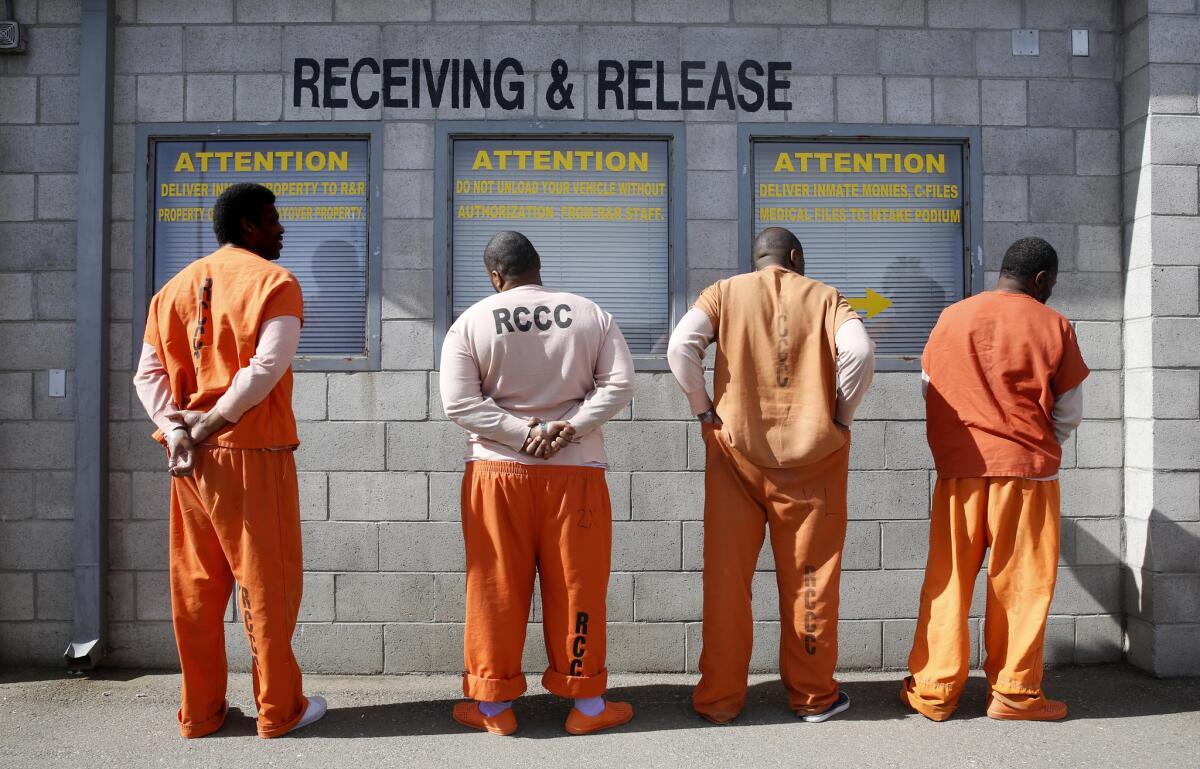Editorial: Pass the U.S. sentencing reform bill to rein in mass incarceration

Prisoners from Sacramento County await processing after arriving at the California Department of Corrections and Rehabilitation Deuel Vocational Institution (DVI) in Tracy, Calif.
- Share via
In October, the Senate Judiciary Committee endorsed legislation to reform draconian federal sentencing laws — particularly for drug offenders — and begin to address the over-incarceration that has devastated poor and minority communities. Remarkably, six Republican members joined the committee’s nine Democrats in supporting the bill, known as the Sentencing Reform and Corrections Act.
But enactment of the Senate bill is now threatened by exaggerated accusations that it would lead to the release of thousands of violent criminals and by a demand that the legislation include new and controversial language defining the “criminal intent” necessary for a conviction. Supporters of the legislation in both parties need to reject amendments that would cripple what would be a historic and humane reform of the federal criminal justice system.
The bill would place limits on mandatory minimum sentences, which often are enacted by Congress in response to panic about perceived “waves” of particular crimes. It would increase the discretion of judges in sentencing and prohibit solitary confinement for juvenile prisoners except when their behavior poses “a serious and immediate risk of physical harm.” (In January, President Obama banned solitary confinement of juveniles in federal prisons by executive action, but that could be reversed by a future administration unless Congress acts.)
Some of the bill’s provisions would be retroactive, meaning that inmates now serving time could petition for resentencing. One provision would make changes in mandatory minimums retroactive under the Fair Sentencing Act of 2010, which reduced the disparity between penalties for crack and powder cocaine from 100:1 to 18:1. The differential treatment of the two had disproportionately punished African Americans.
Although many Republicans — including Judiciary Committee Chairman Sen. Charles E. Grassley of Iowa — support the legislation, other figures in that party have been raising roadblocks. Sen. Ted Cruz of Texas, a candidate for president who voted against the bill in committee, has claimed that its enactment “could result in more violent criminals being let out on the streets, and potentially more lives being lost.” Sen. Tom Cotton of Arkansas claimed that the bill would “lead to the release of thousands of violent felons.” This is scaremongering. Although the bill would provide relief to some prisoners with violent offenses in their past, experts dismiss the claim that it would result in the release of large numbers of violent criminals.
The second roadblock concerns an arcane but important question about what state of mind should be required for conviction of a crime. Sen. Orrin Hatch (R-Utah) complains that some federal criminal statutes lack a mens rea, or statement of the required criminal intent. As a result, individuals can in some cases be convicted even when they didn’t know that their conduct was wrong or unlawful or when they didn’t act “knowingly,” “willfully,” “recklessly” or “negligently.” Hatch said that a person who mistakenly retrieves the wrong coat from the coat room should not be considered a thief, because he did not intend to steal. He also noted the case of a fisherman who was prosecuted for violating a law against selling sea otters to non-native Alaskans — even though he didn’t know the buyer wasn’t a native.
Hatch has proposed legislation to provide a default mens rea — literally, “guilty mind” — standard to govern cases in which a particular statute doesn’t spell out the required state of mind: The defendant would have to have engaged in a criminal act “willfully” in order to be prosecuted. Ominously, Hatch suggested that “any package of criminal justice reforms must include” provisions to shore up mens rea protections. Disagreement over adding that could provide Senate Majority Leader Mitch McConnell with a pretext for not bringing the bill to a vote.
Criminal intent is an important principle. As Chief Justice John G. Roberts Jr. noted last year, under American law a defendant must be “blameworthy in mind” before he can be found guilty. At some point Congress may want to take up the issue of whether the intent requirement should be clarified. But there is no reason to hold this bill hostage to Hatch’s proposal, which is opposed by members of Congress who fear it would make it harder to prosecute white-collar and environmental crimes. First things first.
Follow the Opinion section on Twitter @latimesopinion and Facebook
More to Read
A cure for the common opinion
Get thought-provoking perspectives with our weekly newsletter.
You may occasionally receive promotional content from the Los Angeles Times.









